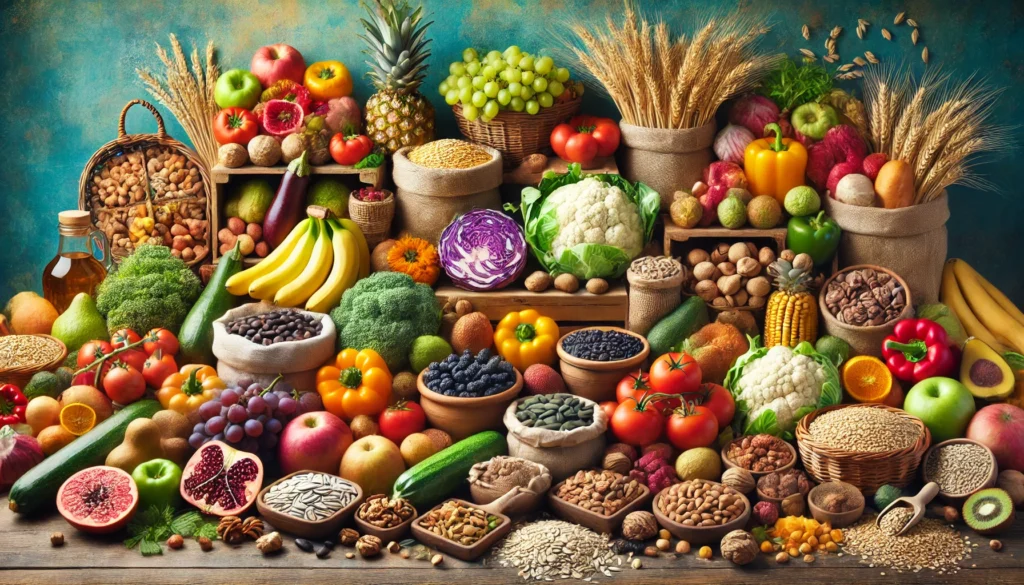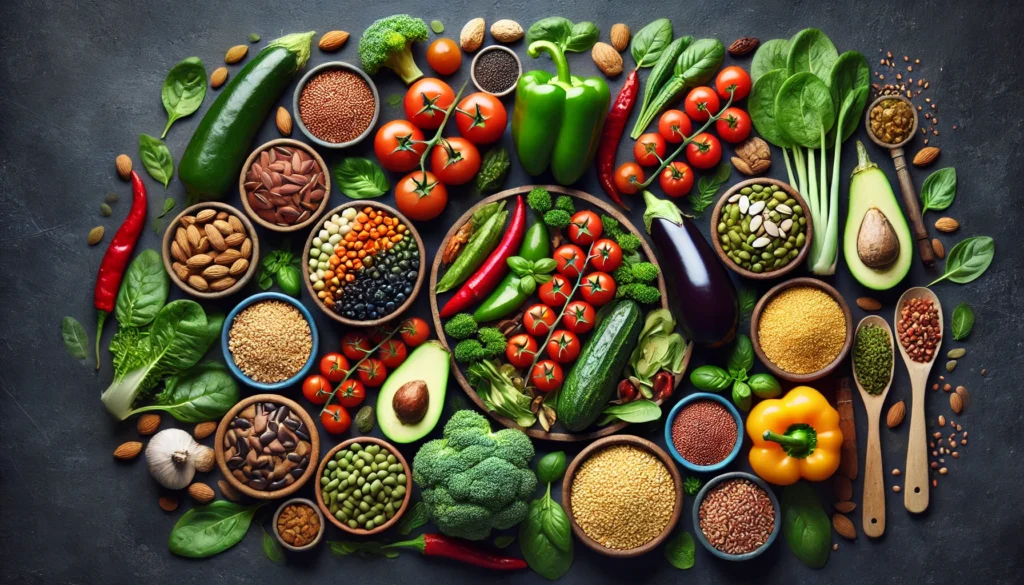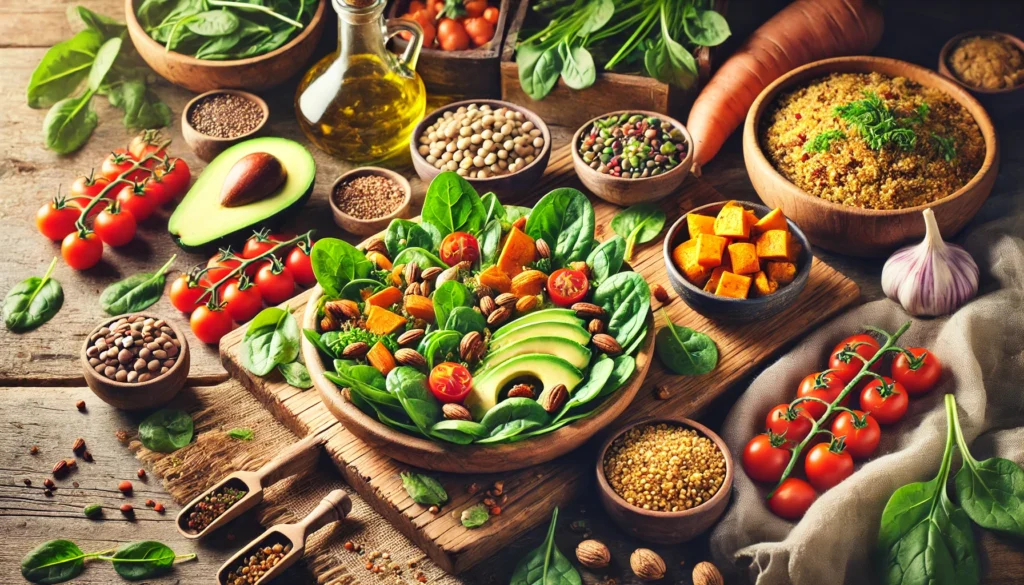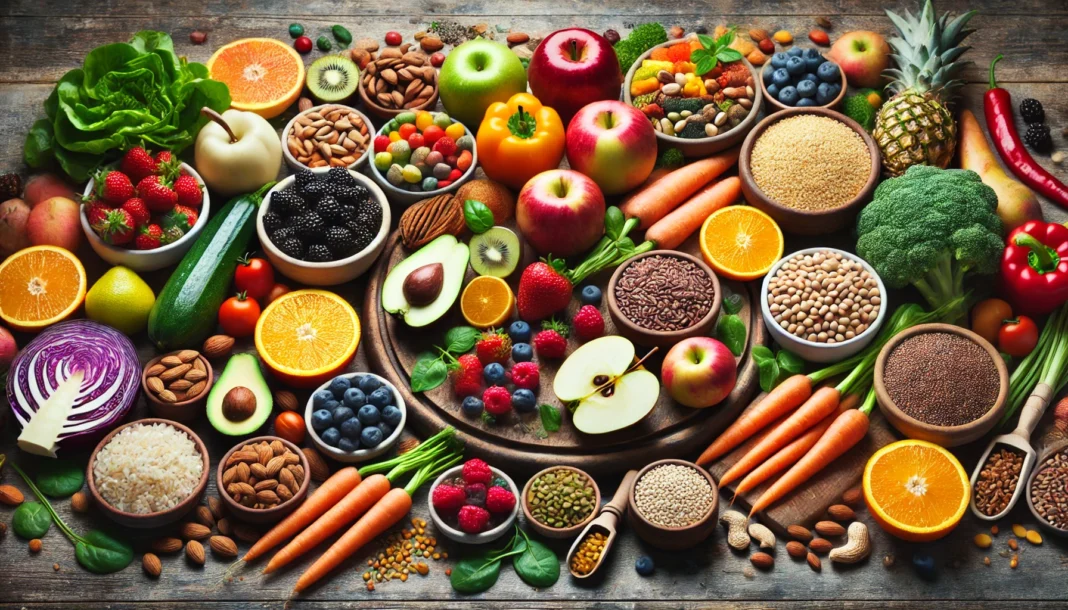Understanding the Importance of Plant-Based Nutrition
A plant-based diet emphasizes whole, nutrient-dense foods derived from plants. These foods provide essential vitamins, minerals, antioxidants, and fiber, all of which contribute to overall health and well-being. Scientific research has consistently shown that incorporating a variety of plant-based foods into one’s diet can reduce the risk of chronic diseases such as heart disease, diabetes, and certain types of cancer. Additionally, plant-based nutrition supports digestive health, promotes healthy weight management, and can enhance longevity. As more people recognize the benefits of this dietary approach, understanding the full spectrum of available plant-based foods becomes essential.
You may also like: How to Start a Whole Food Plant-Based Diet: A Beginner’s Guide to Healthier Eating
A well-rounded list of plant-based foods encompasses fruits, vegetables, legumes, nuts, seeds, and whole grains. These foods provide not only macronutrients such as carbohydrates, proteins, and healthy fats but also micronutrients that are vital for maintaining optimal health. Unlike processed foods, which often contain unhealthy additives and preservatives, plant-based foods are naturally rich in fiber and phytochemicals that help combat inflammation and oxidative stress. By exploring the diverse options within a plant-based diet, individuals can create well-balanced, delicious meals that support long-term health goals.

Fruits: Nature’s Sweet and Nutrient-Rich Offerings
Fruits are an essential component of a plant-based diet, offering an abundance of vitamins, minerals, and antioxidants. They are naturally rich in fiber, which supports digestive health and helps regulate blood sugar levels. Berries such as blueberries, strawberries, raspberries, and blackberries are particularly renowned for their high levels of antioxidants, which protect the body from oxidative stress and inflammation. These small but powerful fruits are packed with vitamin C, which supports immune function and skin health.
Citrus fruits, including oranges, lemons, limes, and grapefruits, provide a substantial dose of vitamin C and flavonoids, which contribute to cardiovascular health. Their natural acidity can aid digestion and enhance iron absorption from plant-based foods. Tropical fruits such as mangoes, pineapples, papayas, and bananas offer a wide range of vitamins and minerals, including potassium, which plays a crucial role in maintaining electrolyte balance and muscle function. Apples, pears, peaches, and plums provide dietary fiber that promotes satiety and gut health, making them excellent choices for maintaining a healthy weight.
Incorporating a variety of fruits into a plant-based diet ensures that the body receives a diverse array of nutrients. Consuming fruits in their whole form rather than as juices preserves their fiber content, which is essential for regulating digestion and preventing blood sugar spikes. Whether eaten fresh, dried, or blended into smoothies, fruits are a delicious and essential part of a well-rounded plant-based diet.
Vegetables: The Foundation of a Plant-Based Diet
Vegetables are among the most nutrient-dense foods available, providing essential vitamins, minerals, and antioxidants while being low in calories. Leafy greens such as spinach, kale, Swiss chard, and collard greens are rich in iron, calcium, and vitamin K, all of which are vital for bone health and blood clotting. These greens also contain folate, an essential B vitamin that supports cellular function and DNA synthesis.
Cruciferous vegetables, including broccoli, cauliflower, Brussels sprouts, and cabbage, contain compounds known as glucosinolates, which have been shown to support detoxification and reduce inflammation. These vegetables are also high in fiber, aiding digestion and promoting a healthy gut microbiome. Root vegetables such as carrots, beets, sweet potatoes, and turnips provide complex carbohydrates that serve as an excellent source of sustained energy. Their high beta-carotene content supports vision health and immune function.
Allium vegetables, such as onions, garlic, leeks, and shallots, offer unique health benefits due to their sulfur-containing compounds, which have been linked to heart health and anti-inflammatory properties. Peppers, tomatoes, cucumbers, and zucchini contribute to a diverse range of flavors and nutrients, making plant-based meals more enjoyable and nutritious. By including a variety of vegetables in daily meals, individuals can maximize their nutrient intake and promote overall health.
Legumes: A Powerful Source of Plant-Based Protein
Legumes, including beans, lentils, peas, and chickpeas, are an excellent source of plant-based protein, fiber, and essential nutrients. They are particularly valuable for individuals following a plant-based diet as they provide an alternative to animal protein. Beans such as black beans, kidney beans, navy beans, and pinto beans contain high levels of fiber and antioxidants, supporting heart health and digestive function.
Lentils are a versatile and nutrient-dense legume, offering a rich source of iron, folate, and plant-based protein. They are a staple in many global cuisines and can be incorporated into soups, stews, and salads. Chickpeas, also known as garbanzo beans, are commonly used in Mediterranean and Middle Eastern cuisine. They are high in protein, fiber, and healthy fats, making them an excellent addition to plant-based diets.
Peas, including green peas, split peas, and snow peas, provide a good balance of protein and carbohydrates. They contain essential vitamins such as vitamin A and C, as well as minerals like iron and magnesium. Including legumes in meals can help individuals meet their protein needs while benefiting from the additional fiber and micronutrients they offer.
Nuts and Seeds: Nutrient-Dense Powerhouses
Nuts and seeds are rich sources of healthy fats, protein, vitamins, and minerals. Almonds, walnuts, cashews, and pecans provide heart-healthy monounsaturated fats and omega-3 fatty acids, which support brain function and cardiovascular health. These nuts also contain important minerals such as magnesium and zinc, which play a role in immune function and metabolism.
Seeds such as chia seeds, flaxseeds, sunflower seeds, and pumpkin seeds offer a concentrated source of essential nutrients. Chia and flaxseeds are particularly high in omega-3 fatty acids and fiber, which help maintain healthy cholesterol levels and support digestive health. Sunflower and pumpkin seeds provide protein and antioxidants, making them valuable additions to a plant-based diet.
Incorporating nuts and seeds into daily meals can enhance nutritional intake while adding texture and flavor. They can be sprinkled on salads, blended into smoothies, or used as a base for plant-based dressings and spreads. Their versatility makes them an essential component of a well-balanced plant-based diet.

Frequently Asked Questions (FAQ) About Plant-Based Foods
1. What are the benefits of incorporating a diverse list of plant-based foods into my diet?
A diverse list of plant-based foods provides an array of nutrients that support overall health. By including a variety of fruits, vegetables, legumes, nuts, seeds, and whole grains, individuals ensure they receive a broad spectrum of vitamins, minerals, and antioxidants. This variety also improves gut health by promoting a balanced microbiome, which is essential for digestion and immune function. Additionally, consuming different plant-based foods enhances satiety and helps regulate blood sugar levels, reducing the risk of metabolic disorders. Emphasizing diversity in a plant-based diet prevents nutrient deficiencies and makes meals more enjoyable and sustainable over the long term.
2. How can I ensure I get enough protein from a plant-based diet?
Getting enough protein from a plant-based diet requires strategic meal planning and incorporating a wide range of protein-rich foods. Legumes such as lentils, chickpeas, and black beans are excellent sources of plant-based protein, providing essential amino acids necessary for muscle repair and growth. Whole grains like quinoa, farro, and bulgur also contribute to protein intake while supplying fiber and minerals. Nuts and seeds, including almonds, chia seeds, and hemp seeds, offer an additional protein boost along with healthy fats. Combining different plant foods throughout the day helps ensure that all essential amino acids are consumed, supporting optimal health and energy levels.
3. Can a plant-based diet provide all essential vitamins and minerals?
A well-planned plant-based diet can provide nearly all essential vitamins and minerals, though some nutrients require special attention. Vitamin B12, primarily found in animal products, should be supplemented or obtained from fortified plant-based foods such as nutritional yeast and plant milks. Iron, found in legumes, spinach, and tofu, is more easily absorbed when paired with vitamin C-rich foods like citrus fruits and bell peppers. Omega-3 fatty acids, vital for brain and heart health, can be sourced from flaxseeds, chia seeds, and walnuts. Ensuring a balanced intake of a wide list of plant foods supports adequate nutrition and long-term well-being.
4. How does a plant-based diet impact long-term health?
Numerous studies suggest that a diet rich in plant-based foods can contribute to long-term health benefits. Plant foods contain powerful antioxidants and anti-inflammatory compounds that reduce the risk of chronic diseases such as heart disease, diabetes, and cancer. Diets centered around whole plant foods support weight management by promoting satiety and reducing excess calorie intake. Additionally, high-fiber plant-based diets improve digestive health and lower cholesterol levels, leading to better cardiovascular outcomes. Over time, consistent consumption of a nutrient-dense plant-based diet fosters longevity and enhances overall vitality.
5. How can I transition to a plant-based diet without feeling deprived?
Transitioning to a plant-based diet can be enjoyable and fulfilling when approached with a focus on variety and flavor. Experimenting with plant-based recipes that incorporate herbs, spices, and different cooking methods helps make meals satisfying. Substituting familiar animal-based dishes with plant-based alternatives, such as using lentils in place of ground beef or cashew-based sauces instead of dairy, can ease the transition. Exploring global cuisines that naturally emphasize plant foods, such as Mediterranean or Asian dishes, introduces new flavors and textures. Gradually increasing the proportion of plant-based foods in meals allows for a smoother and more sustainable shift.
6. What are some practical ways to incorporate more plant-based foods into daily meals?
Integrating more plant-based foods into daily meals can be simple and rewarding. Swapping refined grains for whole grains such as quinoa, brown rice, or oats increases fiber intake and provides essential nutrients. Adding legumes like lentils and chickpeas to soups, salads, and stews boosts protein and satiety. Snacking on raw nuts, seeds, or fruit ensures a steady intake of vitamins and healthy fats throughout the day. Smoothies made with leafy greens, berries, and plant-based milk provide a nutrient-packed breakfast or snack option. Small, consistent changes make it easier to embrace a plant-based lifestyle while maintaining a balanced and varied diet.
7. How does a plant-based diet impact athletic performance?
Many athletes thrive on a plant-based diet due to its high nutrient density and anti-inflammatory properties. Plant foods provide complex carbohydrates, which serve as a primary energy source for endurance activities. Protein from legumes, nuts, and seeds supports muscle recovery and growth without the inflammatory effects of processed meats. Antioxidants in plant foods help reduce oxidative stress and speed up recovery after intense workouts. Additionally, improved blood flow from consuming plant-based foods rich in nitric oxide, such as beets and leafy greens, enhances endurance and overall performance. Many elite athletes have successfully adopted plant-based nutrition to optimize strength, stamina, and recovery.
8. Are plant-based diets environmentally sustainable?
Plant-based diets are widely recognized for their positive impact on environmental sustainability. Producing plant foods generally requires fewer resources, such as water and land, compared to animal agriculture. Growing legumes, grains, and vegetables generates significantly lower greenhouse gas emissions, helping to reduce the carbon footprint associated with food production. Choosing a diet centered on plant-based foods supports biodiversity and reduces deforestation caused by livestock farming. By prioritizing locally sourced, seasonal plant foods, individuals can further decrease their environmental impact while enjoying fresh and nutritious meals. Shifting towards plant-based eating contributes to a more sustainable and eco-friendly food system.
9. What are some lesser-known plant-based foods that provide unique health benefits?
Exploring a diverse list of plant-based foods introduces lesser-known yet highly nutritious options. Sea vegetables, such as nori, wakame, and dulse, provide iodine and trace minerals essential for thyroid function. Fermented plant foods like tempeh, kimchi, and miso support gut health by supplying beneficial probiotics. Ancient grains, including teff, amaranth, and sorghum, offer unique nutrient profiles and are excellent gluten-free alternatives. Edible flowers, such as nasturtiums and hibiscus, provide antioxidants and add vibrant colors to meals. Including a variety of these less common plant-based foods expands dietary diversity and enhances nutritional benefits.
10. How can plant-based eating be balanced for different life stages and health conditions?
Plant-based diets can be adapted to suit different life stages and specific health needs. Pregnant individuals can meet increased nutrient requirements by consuming iron-rich legumes, calcium-fortified plant milks, and protein-dense tofu or tempeh. For growing children, incorporating a range of plant-based protein sources ensures adequate growth and development. Older adults benefit from plant foods that support bone health, such as leafy greens, almonds, and fortified cereals containing vitamin D and calcium. People with specific health conditions, such as diabetes or heart disease, can tailor their plant-based diet by prioritizing whole grains, legumes, and low-glycemic fruits. Customizing a plant-based diet based on individual health needs ensures optimal wellness throughout all life stages.

Whole Grains: The Foundation of Energy and Nutrition
Whole grains are a vital component of plant-based diets, providing complex carbohydrates, fiber, and essential nutrients. Quinoa, brown rice, oats, barley, and whole wheat products are excellent sources of energy and fiber, which support digestion and metabolic health. Unlike refined grains, whole grains retain their nutrient-rich bran and germ layers, making them a superior choice for sustained energy and overall well-being.
Quinoa, a complete protein, contains all nine essential amino acids, making it a valuable grain for those following plant-based diets. Oats provide beta-glucan fiber, which has been shown to lower cholesterol levels and support heart health. Brown rice and barley offer essential minerals such as magnesium and selenium, which contribute to immune function and bone health.
By incorporating whole grains into meals, individuals can experience steady energy levels and improved digestive health. Choosing whole grains over refined grains ensures that the body receives the full spectrum of nutrients necessary for optimal health.
Further Reading:
Beginner’s Guide to A Whole-Foods, Plant-Based Diet
Complete Plant-Based Diet Grocery List
Plant-Based Diets: A Physician’s Guide
plant-based nutrition, whole food diet, vegan food list, healthy plant foods, plant-based protein sources, nutrient-rich vegetables, best fruits for health, legumes for protein, nuts and seeds benefits, whole grains nutrition, plant-based diet benefits, sustainable eating, heart-healthy foods, high-fiber diet, antioxidant-rich foods, meat alternatives, dairy-free diet, plant-based meal planning, superfoods for health, clean eating guide
The information contained in this article is provided for general informational purposes only and is not intended to serve as medical, legal, or professional advice. While NewsHealthWatch strives to present accurate, up-to-date, and reliable content, no warranty or guarantee, expressed or implied, is made regarding the completeness, accuracy, or adequacy of the information provided. Readers are strongly advised to seek the guidance of a qualified healthcare provider or other relevant professionals before acting on any information contained in this article. NewsHealthWatch, its authors, editors, and contributors expressly disclaim any liability for any damages, losses, or consequences arising directly or indirectly from the use, interpretation, or reliance on any information presented herein. The views and opinions expressed in this article are those of the author(s) and do not necessarily reflect the official policies or positions of NewsHealthWatch.

